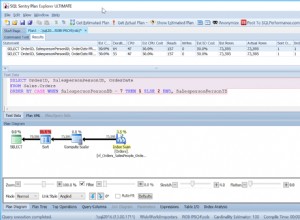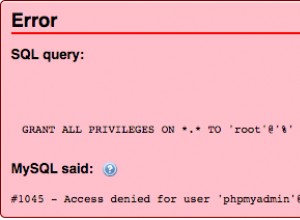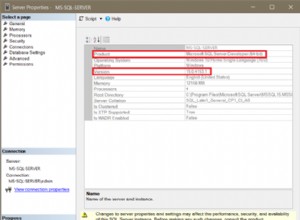Als MySQL Handbuch sagt:
Schauen wir uns die Beispieltabelle an:
mysql> select * from articles;
+----+-----------------------+------------------------------------------+
| id | title | body |
+----+-----------------------+------------------------------------------+
| 1 | PostgreSQL Tutorial | DBMS stands for DataBase ... |
| 2 | How To Use MySQL Well | After you went through a ... |
| 3 | Optimizing MySQL | In this tutorial we will show ... |
| 4 | 1001 MySQL Tricks | 1. Never run mysqld as root. 2. ... |
| 5 | MySQL vs. YourSQL | In the following database comparison ... |
| 6 | MySQL Security | When configured properly, MySQL ... |
+----+-----------------------+------------------------------------------+
mysql> SELECT * FROM articles WHERE MATCH (title,body)
AGAINST ('"database comparison"' IN BOOLEAN MODE);
+----+-------------------+------------------------------------------+
| id | title | body |
+----+-------------------+------------------------------------------+
| 5 | MySQL vs. YourSQL | In the following database comparison ... |
+----+-------------------+------------------------------------------+
Die Reihenfolge ist wichtig, wenn die Wörter zitiert werden:
mysql> SELECT * FROM articles WHERE MATCH (title,body)
AGAINST ('"comparison database"' IN BOOLEAN MODE);
Empty set (0.01 sec)
Wenn wir die Anführungszeichen entfernen, wird nach Zeilen gesucht, die die Wörter „Datenbank“ oder „Vergleich“ enthalten:
mysql> SELECT * FROM articles WHERE MATCH (title,body)
AGAINST ('database comparison' IN BOOLEAN MODE);
+----+---------------------+------------------------------------------+
| id | title | body |
+----+---------------------+------------------------------------------+
| 1 | PostgreSQL Tutorial | DBMS stands for DataBase ... |
| 5 | MySQL vs. YourSQL | In the following database comparison ... |
+----+---------------------+------------------------------------------+
Reihenfolge spielt jetzt keine Rolle:
mysql> SELECT * FROM articles WHERE MATCH (title,body)
AGAINST ('comparison database' IN BOOLEAN MODE);
+----+---------------------+------------------------------------------+
| id | title | body |
+----+---------------------+------------------------------------------+
| 1 | PostgreSQL Tutorial | DBMS stands for DataBase ... |
| 5 | MySQL vs. YourSQL | In the following database comparison ... |
+----+---------------------+------------------------------------------+
Wenn wir Zeilen erhalten möchten, die entweder das Wort „PostgreSQL“ oder den Ausdruck „Datenbankvergleich“ enthalten, sollten wir diese Anfrage verwenden:
mysql> SELECT * FROM articles WHERE MATCH (title,body)
AGAINST ('PostgreSQL "database comparison"' IN BOOLEAN MODE);
+----+---------------------+------------------------------------------+
| id | title | body |
+----+---------------------+------------------------------------------+
| 1 | PostgreSQL Tutorial | DBMS stands for DataBase ... |
| 5 | MySQL vs. YourSQL | In the following database comparison ... |
+----+---------------------+------------------------------------------+
Stellen Sie sicher, dass die Wörter, nach denen Sie suchen, nicht in den Liste der Stoppwörter , die ignoriert werden.




